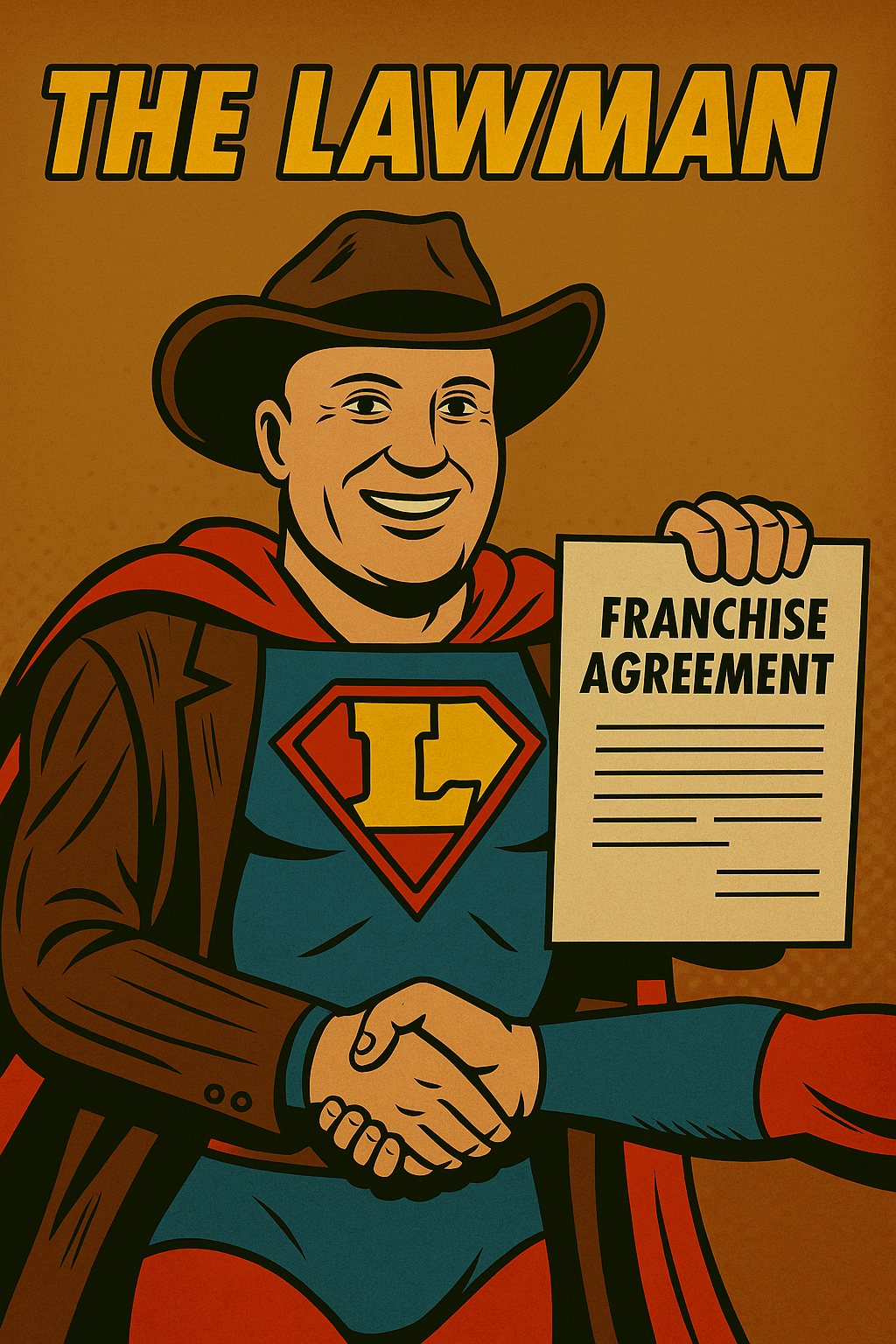The Lawman Explains the Fine Print Behind Every Franchise Deal
When you decide to buy a franchise, you’re not just opening a business—you’re entering into a legal relationship. The document that defines every aspect of this relationship is the franchise agreement. It’s the cornerstone of your rights, responsibilities, and the rules you must follow as a franchisee.
Think of it as your superhero code, your rulebook for joining the league. And no one understands the value of a clear, binding contract better than The Lawman—protector of fairness, enforcer of clarity, and guardian of agreements.
Let’s dive into what a franchise agreement really is, why it matters, and how to approach it like a savvy business owner—not just a hopeful entrepreneur.
🧾 What Is a Franchise Agreement?
A franchise agreement is a legally binding contract between a franchisor (the brand owner) and a franchisee (you). It outlines the terms under which the franchisee can operate a business using the franchisor’s brand, system, and intellectual property.
This contract ensures consistency across all franchise units while protecting the integrity of the brand.
It’s usually signed after:
- Reviewing the Franchise Disclosure Document (FDD)
- Completing your due diligence
- Attending Discovery Day or final meetings
And once you sign, you’re locked in—so understanding every clause is critical.
🔍 Key Components of a Franchise Agreement
Here are the most important parts you’ll find in nearly every franchise agreement:
1. Franchise Grant
This outlines what you’re being granted: usually the right to open and operate one or more units within a defined territory using the franchisor’s system.
2. Territory
The agreement will specify your protected area (if any). It defines where you can market and sell without overlapping with other franchisees.
Lawman Tip: Make sure you understand if your territory is exclusive, non-exclusive, or protected.
3. Term and Renewal
The initial duration of your franchise rights—often 5 to 10 years—is outlined here, along with your renewal options.
Look closely at:
- Conditions for renewal
- Whether you’ll pay another fee
- How far in advance you must give notice
4. Franchise Fees
Your initial franchise fee, typically paid upfront, is stated clearly. The agreement will also list ongoing fees such as:
- Royalties (percentage of gross sales)
- Marketing fund contributions
- Technology or software access fees
5. Training and Support
What the franchisor provides before and after launch, including initial training, ongoing coaching, and systems support.
This section holds them accountable—but also sets the limits of their responsibility.
6. Brand Standards
Franchisees must follow the franchisor’s rules to protect the brand. This includes everything from:
- Uniforms and signage
- Store layout
- Product offerings
- Customer service protocols
Deviating from these rules can result in penalties—or termination.
📉 Performance Standards
Franchisors often include minimum sales, marketing efforts, or hours of operation you must meet. Falling short can put your agreement in jeopardy.
Some agreements include a “reversion clause”—if you underperform, you could lose your territory.
🧠 Intellectual Property Rights
You’ll be licensed to use trademarks, logos, slogans, and proprietary systems—but you don’t own them. The franchisor retains all intellectual property rights.
Make sure you understand:
- When and how you can use the brand
- Restrictions on modifying logos or advertising
- What happens if you leave the system
❌ Restrictions
There are typically several restrictions placed on you:
- Non-compete clauses: You may be prohibited from owning or working in a similar business during and after your franchise term.
- Operating restrictions: Limits on what products or services you can offer.
- Transfer restrictions: You often need approval to sell your franchise.
The Lawman says: “Read the restrictions carefully—they’re there to protect the brand, but they can limit your business freedom.”
🔁 Renewal, Transfer, and Termination
This part of the agreement covers:
- How and when you can renew the contract
- What conditions must be met to sell or transfer your business
- Under what circumstances the franchisor can terminate the agreement
Grounds for Termination may include:
- Failure to pay fees
- Violation of brand standards
- Criminal activity
- Repeated customer complaints
After termination, you’ll likely be required to:
- Stop using all branding and trademarks
- Return manuals and proprietary information
- Possibly pay damages or penalties
🏛️ Dispute Resolution
Most agreements specify how disputes are handled. This may include:
- Arbitration clauses
- Jurisdiction (where legal disputes are handled)
- Attorney’s fees
Always consider what rights you may be waiving and whether arbitration is mandatory.
📚 Why You Need Legal Review
You should never sign a franchise agreement without having it reviewed by a franchise attorney. These contracts are complex and written in favor of the franchisor.
A lawyer can help:
- Interpret legal jargon
- Identify unfavorable terms
- Recommend negotiation strategies
The Lawman’s Rule: “Know what you’re signing. You’re not just buying a business—you’re agreeing to how you’ll run it for years.”
🦸 Conclusion: The Franchise Agreement Is Your Guide—and Your Guardrails
Signing a franchise agreement is a big step—it’s your official entry into an established business family. It sets the tone for your entire experience, and understanding it thoroughly is essential to your success.
Think of it like this:
- It protects the franchisor’s brand
- It defines the franchisee’s responsibilities
- It outlines the path to success, renewal, or exit
The Lawman reminds us:
“A strong agreement protects both sides. Read it, question it, and honor it.”
📅 Next Blog: “What’s the Difference Between a Franchise and a License?”
#TheLawman #FranchiseAgreement #LegalTips #FranchiseOwnership #FranchiseMan #EntrepreneurLaw #SmallBusiness #FranchiseTips #FranchisingExplained

